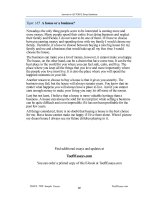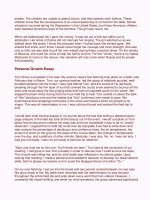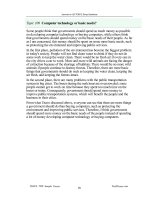Answers to all toefl essay question part 51
Bạn đang xem bản rút gọn của tài liệu. Xem và tải ngay bản đầy đủ của tài liệu tại đây (68.06 KB, 10 trang )
Life is short. Why do you want spend 2-6 years of your life at a particular college, graduate
school, or professional school? How is the degree necessary to the fulfillment of your goals?
When considering goals, think broadly. Few people would be satisfied with just a career.
How else will your education fit your needs and lead you to a fulfilling life?
If after reading this entire page you do not have an idea for your essay, do not be surprised.
Coming up with an idea is difficult and requires time. Actually consider the questions and
exercises above. Without a topic you feel passionate about, without one that brings out the
defining aspects of you personality, you risk falling into the trap of sounding like the 90
percent of applicants who will write boring admissions essays. The only way to write a
unique essay is to have experiences that support whatever topic you come up with.
Whatever you do, don't let the essay stress you out. Have fun with the brainstorming
process. You might discover something about yourself you never consciously realized.
Good Luck!
Take EssayEdge.com's
Free Online Admissions Essay Course
Step Two - Selecting an Essay Topic
By EssayEdge.com: Our Editing Makes the Difference
Having completed step one, you should now have a rough idea of the elements you wish to
include in your essay, including your goals, important life experiences, research experience,
diversifying features, spectacular nonacademic accomplishments, etc. You should also now
have an idea of what impression you want to make on the admissions officers.
We should remark that at this stage, undergraduate applicants have a large advantage over
graduate school applicants. Whereas nobody questions a high school student's motivation to
attend college, graduate and professional school applicants must directly address in their
essays their desire to study their selected field.
You must now confront the underlying problem of the admissions essay. You must now
consider topics that will allow you to synthesize your important personal characteristics and
experiences into a coherent whole while simultaneously addressing your desire to attend a
specific institution. While most admissions essays allow great latitude in topic selection, you
must also be sure to answer the questions that were asked of you. Leaving a lasting
impression on someone who reads 50-100 essays a day will not be easy, but we have
compiled some guidelines to help you get started. With any luck, one or two topics, with
small changes, will allow you to answer application questions for 5-7 different colleges,
although admissions officers do appreciate essays that provide convincing evidence of how
an applicant will fit into a particular academic environment. You should at least have read the
college's webpage, admissions catalog, and have an understanding of the institution's
strengths.
Consider the following questions before proceeding:
●
Have you selected a topic that describes something of personal
importance in your life, with which you can use vivid personal
experiences as supporting details?
●
Is your topic a gimmick? That is, do you plan to write your essay in
iambic pentameter or make it funny. You should be very, very careful
if you are planning to do this. We recommend strongly that you do not
do this. Almost always, this is done poorly and is not appreciated by
the admissions committee. Nothing is worse than not laughing or not
being amused at something that was written to be funny or amusing.
●
Will your topic only repeat information listed elsewhere on your
application? If so, pick a new topic. Don't mention GPAs or
standardized test scores in your essay.
●
Can you offer vivid supporting paragraphs to your essay topic? If you
cannot easily think of supporting paragraphs with concrete examples,
you should probably choose a different essay topic.
●
Can you fully answer the question asked of you? Can you address
and elaborate on all points within the specified word limit, or will you
end up writing a poor summary of something that might be interesting
as a report or research paper? If you plan on writing something
technical for college admissions, make sure you truly can back up
your interest in a topic and are not merely throwing around big
scientific words. Unless you convince the reader that you actually
have the life experiences to back up your interest in neurobiology, the
reader will assume you are trying to impress him/her with shallow
tactics. Also, be sure you can write to admissions officers and that you
are not writing over their heads.
●
Can you keep the reader's interest from the first word. The entire
essay must be interesting, considering admissions officers will
probably only spend a few minutes reading each essay.
●
Is your topic overdone? To ascertain this, peruse through old essays.
EssayEdge's 100 free essays can help you do this. However, most
topics are overdone, and this is not a bad thing. A unique or
convincing answer to a classic topic can pay off big.
●
Will your topic turnoff a large number of people? If you write on how
everyone should worship your God, how wrong or right abortion is, or
how you think the Republican or Democratic Party is evil, you will not
get into the college of your choice. The only thing worse than not
writing a memorable essay is writing an essay that will be
remembered negatively. Stay away from specific religions, political
doctrines, or controversial opinions. You can still write an essay about
Nietzsche's influence on your life, but express understanding that not
all intelligent people will agree with Nietzsche's claims. Emphasize
instead Nietzsche's influence on your life, and not why you think he
was wrong or right in his claims.
●
In this vein, if you are presenting a topic that is controversial, you must
acknowledge counter arguments without sounding arrogant.
●
Will an admissions officer remember your topic after a day of reading
hundreds of essays? What will the officer remember about your topic?
What will the officer remember about you? What will your lasting
impression be?
Take EssayEdge.com's
Free Online Admissions Essay Course
Step Three: Writing the Essay, Tips for Success
By EssayEdge.com: Our Editing Makes the Difference
Even seemingly boring topics can be made into exceptional admissions essays with an
innovative approach. In writing the essay you must bear in mind your two goals: to persuade
the admissions officer that you are extremely worthy of admission and to make the
admissions officer aware that you are more than a GPA and a standardized score, that you
are a real-life, intriguing personality.
Unfortunately, there is no surefire step-by-step method to writing a good essay. EssayEdge
editors at will remake your essay into an awesome, memorable
masterpiece, but every topic requires a different treatment since no two essays are alike.
However, we have compiled the following list of tips that you should find useful while writing
your admissions essay.
You can follow the next 11 steps, but if you miss the question, you will not be
admitted to any institution.
Even seemingly boring essay topics can sound interesting if creatively
approached. If writing about a gymnastics competition you trained for, do not
start your essay: "I worked long hours for many weeks to train for XXX
competition." Consider an opening like, "Every morning I awoke at 5:00 to
sweat, tears, and blood as I trained on the uneven bars hoping to bring the
state gymnastics trophy to my hometown."
Admissions officers want to learn about you and your writing ability. Write
about something meaningful and describe your feelings, not necessarily your
actions. If you do this, your essay will be unique. Many people travel to
foreign countries or win competitions, but your feelings during these events
are unique to you. Unless a philosophy or societal problem has interested you
intensely for years, stay away from grand themes that you have little personal
experience with.
For some reason, students continue to think big words make good essays.
Big words are fine, but only if they are used in the appropriate contexts with
complex styles. Think Hemingway.
If you are not adept with imagery, you can write an excellent essay without it,
but it's not easy. The application essay lends itself to imagery since the entire
essay requires your experiences as supporting details. Appeal to the five
senses of the admissions officers.
Expect admissions officers to spend 1-2 minutes reading your essay. You
must use your introduction to grab their interest from the beginning. You
might even consider completely changing your introduction after writing
your body paragraphs.
●
Don't Summarize in your Introduction. Ask yourself why a reader
would want to read your entire essay after reading your introduction. If
you summarize, the admissions officer need not read the rest of your
essay.
●
Create Mystery or Intrigue in your Introduction. It is not necessary
or recommended that your first sentence give away the subject
matter. Raise questions in the minds of the admissions officers to
force them to read on. Appeal to their emotions to make them relate to
your subject matter.
Your introduction can be original, but cannot be silly. The paragraphs that
follow must relate to your introduction.
Applicants continue to ignore trans>
The conclusion is your last chance to persuade the reader or impress upon
them your qualifications. In the conclusion, avoid summary since the essay is
rather short to begin with; the reader should not need to be reminded of what
you wrote 300 words before. Also do not use stock phrases like "in
conclusion, in summary, to conclude, etc." You should consider the following
conclusions:
●
Expand upon the broader implications of your discussion.
●
Consider linking your conclusion to your introduction to establish a
sense of balance by reiterating introductory phrases.
●
Redefine a term used previously in your body paragraphs.
●
End with a famous quote that is relevant to your argument. Do not try
to do this, as this approach is overdone. This should come naturally.
●
Frame your discussion within a larger context or show that your topic
has widespread appeal.
●
Remember, your essay need not be so tidy that you can answer why
your little sister died or why people starve in Africa; you are not writing
a "sit-com," but should forge some attempt at closure.









